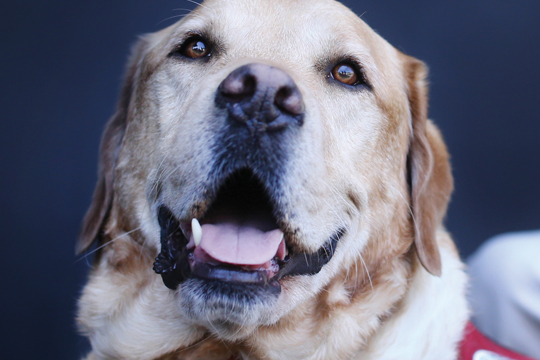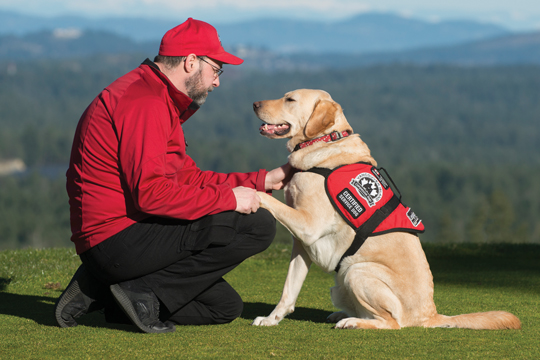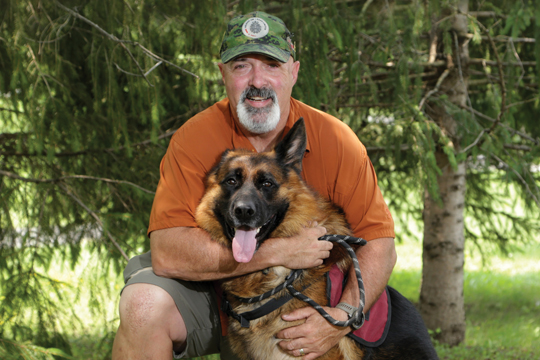
B.C. Guide Dogs is one of the longest-running programs in the country. It has an in-house breeding program of golden retrievers and trains the dogs who board with volunteers throughout the process. Photo: Adrian Lam
Renate Sutherland cries every time she has to say goodbye.
The advocacy program officer for Federal Retirees in British Columbia fosters service dogs for the B.C. Guide Dog program for about five months before she turns them over to their deserving recipients. Since she retired in 2018, she‘s worked with six dogs.
The program — one of several that Wounded Warriors Canada supports — breeds its own golden retrievers through an in-house breeding program and they go to people who live with post-traumatic stress disorder (PTSD) caused by occupational stress injuries from work in the Canadian Armed Forces and RCMP or as first responders.
Sutherland and her husband, Neil Dawe, take in the would-be service dogs when they‘re 18 months old, after they‘ve been fostered by another family while going through rigorous puppy training. Sutherland then works with the young adult dogs — dressed in their service-dog-in-training vests and going almost everywhere she goes — for the next five to six months. It‘s a tryout to see if the pup really has what it takes to become a service dog.
“I support the training,” Sutherland says. “So I have to practise the tasks the dogs are given. The professional trainers do the more intense training. I go to class once a week with a dog and that‘s where I learn its tasks so I can reinforce them at home. I take the dog where I go as much as possible. I‘ve had them come to pedicures and manicures, doctor‘s appointments. It‘s really important that they‘re well behaved and can manage themselves in almost any situation — escalators, [revolving] doors.”
It‘s a 24/7 commitment when the dogs are with her, but it‘s one she loves.
“A big part of it for me is knowing that these dogs will make a huge difference in someone‘s life,” she says. “And sometimes it‘s a whole family. Their lives will change thanks to these dogs. That‘s really important to me. It‘s a continuation of the career I had working in social service settings for 30 years.”
Would-be dog recipients undergo an involved application process to qualify. They have to be referred to a mental health professional, they have to be seen as someone who can benefit and their family has to be on board, if applicable.
“That‘s the same with us as fosters,” Sutherland says. “[The dogs] become part of the family.”
And yes, she cries when they either go on to become service dogs or return to the training centre to be adopted because they didn‘t make the cut. Her dog Dakota is one she boarded and adopted when he was unsuitable to be a service dog.
Of the six she‘s fostered so far, four have become service dogs. She‘s met three of the people who became their recipient.
“I don‘t meet them when they get the dog, but I might at events. If I think I recognize a dog, I approach the trainer and ask the name and I‘ll ask them if the person would be open to my saying hello. Often they are.”
Changing lives
Stephane Marcotte remembers the first time he realized a service dog might be an option for him. Marcotte served in the military for 28 years, 18 of which were in submarines. That‘s where he had some “bad” experiences and was medically released.
“When I retired, I was pretty messed up,” he says. “I was always in my basement — never going out.”
After a while of wallowing, he took action. While at a retreat with Wounded Warriors Canada, he stopped at a booth at a trade show.
“I visited the [service dog] booth,” he says, choking up over the memory. “A dog licked my face and it felt like three years of therapy in one second. I started the process of applying for one right away.”
He enrolled in a two-year Wounded Warrior pilot program.
“I was very dedicated because I knew it would help me and eventually, I was even able to get off my medication,” he says. “I can honestly say I wouldn‘t be here now without my dog.”
He‘s had Sarge for 7½ years and is now retiring him, but, as often happens, he‘ll keep him as a pet. Meanwhile, he qualified for a new dog he‘s been working with since July.

When he met a service dog at a trade show, Stéphane Marcotte said one lick from the dog felt like the equivalent of three years of therapy. He‘s shown here with Sarge, who‘s been his service dog for 7½ years. Photo: John Penner Photography
How it works
Partner organizations of Wounded Warriors Canada provide dogs to people with operational (work-related) stress injuries that led to post-traumatic stress. Not all PTSD sufferers are a good fit for a service dog, but those who are, get a dog, says Mike Annan, executive director of VICD Service Dogs, a division of B.C. Guide Dogs.
“The program is guided by our professional instructors and our mental health director and by the recipients, their families and care providers.”
The dogs spend their first 14 to 16 months in puppy training, living with volunteer puppy raisers. They have a series of behavioural checklists and public-access training that they need to complete to graduate from the puppy program.
“At that point, they enter ‘service dog university‘,” Annan says. “These dogs have to work well in a public space, malls, escalators, public transit.”
The dogs and their owners bond in surprising ways. For example, Stephane Marcotte is diabetic and Sarge notifies him when his blood sugar is low. The dogs also are trained to draw attention to their owners‘ stress- or anxiety-related behaviours.
“Big, deep breaths, head in hands, increased heart rates — we teach them to alert to all of that,” Annan says. “They‘ll rest their chin on your leg if you‘re shaking it; we call it ‘alert to agitation‘.”
One of the dogs‘ biggest jobs is to wake PTSD sufferers from nightmares.
Volunteers such as Sutherland are crucial, Annan says.
“It takes a village to run this program.”
Working from the same playbook
The Wounded Warriors Canada partner programs each work differently, but they‘re all certified according to national standards the organization helped establish.
“We established a baseline of criteria,” says Phil Ralph, director of health services at Wounded Warriors Canada. “One thing we said was that they had to be collegial and complementary and work with each other, which has been amazing. Instead of reinventing the wheel, everyone is learning best practices from each other.”
Wounded Warrior supports nearly $1 million worth of service dog training per year.
“We‘ve provided our mental health resources to the dog trainers and they‘ve provided their dog expertise,” Ralph says. “Twice a year we [hold] an internal conference to learn best practices.”
With non-certified operations, it‘s buyer beware — and the stakes are high as service dogs cost several thousand dollars. Wounded Warriors Canada funds its partners‘ programs so PTSD sufferers get their dogs for free.
Canada‘s certified programs
Quebec‘s Les Chiens Togo partnered with Wounded Warriors in 2017. It has dogs for people with PTSD and it has dogs suited to prevent the onset of PTSD for first responders.
Togo receives about 200 emails a week from people looking for dogs, but the availability of dogs and the resources required to train them means Togo only does between five and 12 pairings a year. Not everyone who emails is eligible, of course, and even fewer are suited for a guide dog. Right now, Togo‘s vetted waiting list has 40 names on it. It gets its dogs from a network of 35 shelters across Quebec.
“We have trained volunteers to assess dogs for us in those shelters,” says Noémie Labbé Roy, Togo‘s founder. “Fewer than one per cent of all dogs we assess will qualify.”
Labbé Roy hopes to access some of B.C. Guide Dog‘s puppies as part of their partnership. She‘s also actively looking for volunteer puppy raisers across the province of Quebec should they start getting dogs more readily.
At Paws Fur Thought in Nova Scotia, Mike and Kim Gingelle are both veterans. They became involved in the sector when Kim returned from a tour of duty in Sierra Leone “broken.” She says her service dog saved her life. To pay it forward, eight years ago she and Mike took over the organization, which was founded in 2013 by another veteran who suffers from PTSD and was overwhelmed by the job.
The Gingelles gets their dogs from Canine Assistance Rehabilitation and Education Services (CARES), which was founded 30 years ago in Concordia, KS. The dogs are trained partly by prisoners who serve as fosters — a win-win for CARES and the prisoners. Paws Fur Thought pairs a dozen PTSD sufferers with dogs each year. While the dogs come fully trained, the Gingelles‘ team trains the recipient — sometimes a bigger job than training the dog, Mike says with a laugh.
In Barrie, Ont., K-9 Country Inn owner Laura A. Mackenzie has two programs. The first involves the recipient intensively training the dog from the age of eight weeks, with the help of professional trainers, over a period of two years. The second involves older adult dogs, whose recipient starts training with the dog when it‘s six months old. K-9 Country Inn gets its dogs — golden retrievers, Labradors and the occasional Labradoodle — from a network of breeders across Ontario.

Richard Moreau is training his dog Timo remotely through K-9 Country Inn, a Barrie, Ont. organization. Photo: Mike Carroccetto
Another warrior on the mend
Richard Moreau, who is retired from the Forces and now serves in the reserves, was vacationing in New Orleans when he could no longer ignore his PTSD.
He was walking on Bourbon Street when suddenly, he was back in Mogadishu, Somalia, where he‘d served 30 years prior.
“Things get a little hot in crowded places. It took me back 30 years and I was physically ill. I was freaking out.”
When a friend of 40 years told him he should investigate whether he had PTSD, he sought counselling through Veterans Affairs Canada and then secured a psychiatric referral.
Today, he‘s working virtually with K-9 Country Inn to train his German Shepherd Timo, acquired from a breeder near his home in Rockland, Ont.
“It‘s a journey,” he says, of his relationship with Timo, who is already proving beneficial. Because he didn‘t want to wait to go through Wounded Warriors, he is training the dog himself with help from afar, and is paying for everything himself.
“I wanted to be proactive,” he says. “I‘ve lost friends to suicide.”

